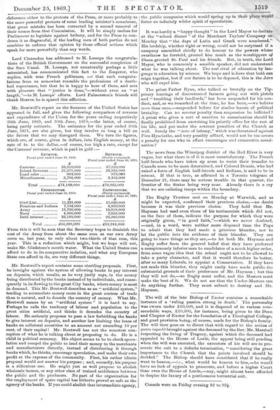Mr. Boutwell's report on the finances of the United States
has appeared in full, and gives the following comparison of revenue and expenditure of the Union for the years ending respectively :30th June, 1869, and 30th June, 1870,—the latter, of course, being partly estimate. The estimates for the year ended 30th .June, 1871, are also given, but they involve so long a bill on the future that we may disregard them. We turn the figures, which are, of course, given in dollars, into English money, at the rate of 4s. to the dollar,—of course, too high a rate, except for the Customs' revenue, which is paid in gold :—
REvinurs. REVENUE.
Fiscal year ended June 30, 1869. (Partly estimated)
Fiscal year ended June 30, 1870.
Customs
36,010,000 37,520,000 Inland Revenue 31,671,000 34,985,000 Land sales 804,000 978,000 Miscellaneous 5,704,000 5,482,000 Total X74,189,000 X78,965,000
EXPENDITURE. EXPENDITURE.
Fiscal year ended June 80,1869. (Partly estimated) Fiscal year ended June 30, 1870.
X X
'Civil List 11,295,000 11,020,000 Pensions and Indians 7,104,000 6,909,000 Army 15,700,000 10,819,000 Navy 4,000,000 3,956,000 Debt interest 26,199,000 26,240,000 Total £64,298,000 £58,944,000 From this it will be seen that the Secretary hopes to diminish the cost of the Army from about the same sum as our own Army costs us, last year, to only about two-thirds of that sum, this year. This is a reduction which might, but we hope will not, make Mr. Gladstone's mouth water. What the United States can afford to do in its comparative isolation, and what any European State can afford to do, are very different things.


































 Previous page
Previous page